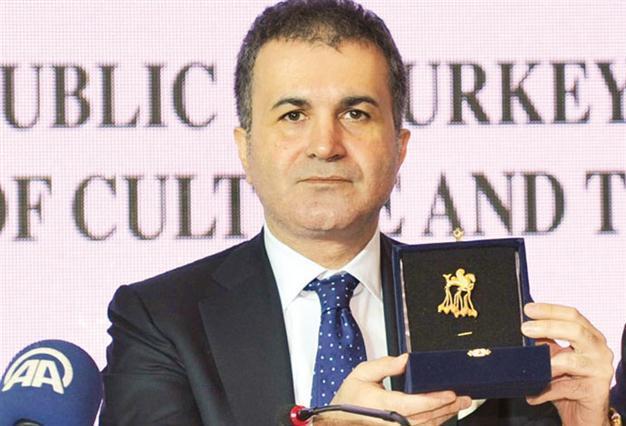Turkey receives golden seahorse treasure back
ISTANBUL- Hürriyet Daily News

Culture and Tourism Minister Ömer Çelik has made a statement about the return of the seahorse brooch at the International Berlin Tourism Stock Market Fair. Çelik also thanked former minister Ertuğrul Günay. AA photo
Turkey has successfully received back a winged seahorse brooch that was originally produced by the Lydians after it was found in Germany amid its continuing efforts to repatriate artifacts that were removed from the country over the years.The brooch, which was stolen from a museum in the inner Aegean province of Uşak in 2005, has been returned to the facility for display.
The winged seahorse brooch is made of pure gold and is worth millions of Turkish Liras. The treasures of the Lydian Hoard, also known as the Karun Treasure, are believed to date back to the sixth century B.C.
After it was found in the German city of Hagen, the piece was kept in a safety deposit box at the German Central Bank.
Culture and Tourism Minister Ömer Çelik has made a statement about the return of the seahorse brooch at the International Berlin Tourism Stock Market Fair.
“I thank our former Culture and Tourism Minister Ertuğrul Günay,” said Culture Minister Ömer Çelik said and added:“I want to say welcome to our treasure to Anatolia, wher it has belonged,” .
Noting that the brooch will be taken to Turkey today, Çelik said it will be preserved and protected at the Turkish Embassy in Germany, Berlin.
Çelik also thanked German representatives who have involved.
The restitution of the brooch
The restitution of the brooch is part of a wider Turkish campaign that has raised eyebrows in the foreign media, with some archaeologists in foreign countries accusing Turkey of being aggressive and engaging in blackmail.
Turkey has so far repatriated up to 3,700 stolen artifacts from foreign countries over the last seven years.
Bulgaria and Greece have followed Turkey’s policy and pursued their own stolen artifacts, stressing that these initiatives have significantly damaged the stolen artifact market. However, the market remains deep-rooted and requires considerable effort to combat given the desire of some collectors and wealthy individuals to open their own museums, according to officials.
Works on the stolen artifacts
Earlier collaboration between Turkey and the American University of Pennsylvania’s Museum of Archaeology and Anthropology had resulted in 24 pieces of gold jewelry, unearthed from the ancient city of Troy in the northwest province of Çanakkale, being returned to Turkey after 46 years. Among the returned artifacts are some very valuable pieces.
The ministry has been successful in recent years in their efforts to repatriate historic artifacts that had been smuggled out of the country, the former Culture and Tourism Minister Günay said, adding that 869 pieces of art were returned to Turkey between 1993 and 2003, 1,000 pieces of art were brought home between 2003 and 2007 and that 3,336 pieces have been repatriated since September 2007.
Artifacts and artworks returned to the country in the last five years came from the United States, Austria, Germany, the United Arab Emirates, Switzerland, Croatia and Serbia. An agreement was recently reached with Bulgaria to return smuggled art, leading the ministry to estimate that the number of returned items will reach 4,000.
















